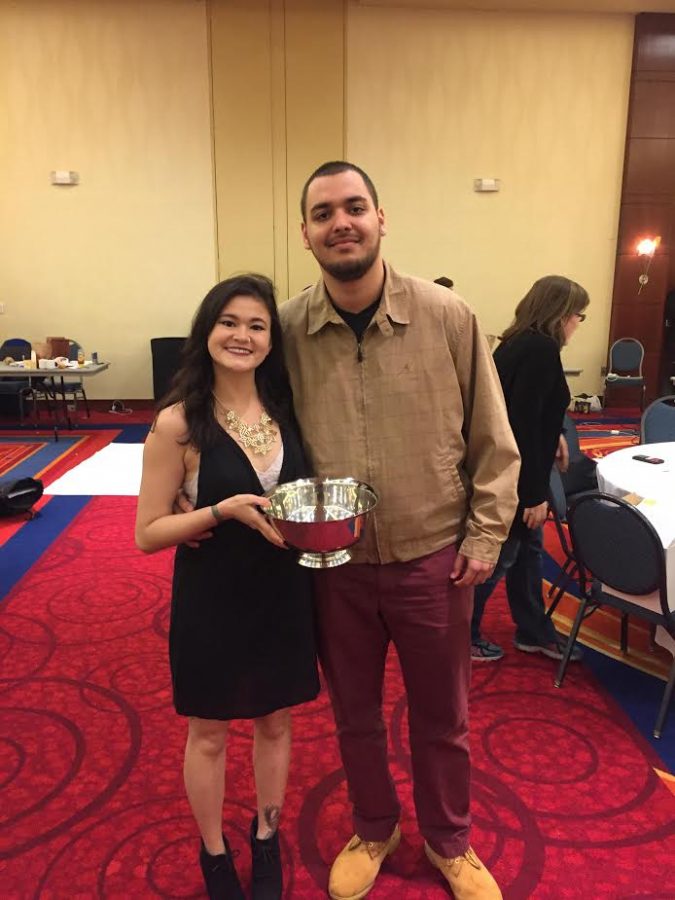After advancing to the final four at the National Debate Tournament, Wake Forest Debate also claimed its third-straight title at the ACC Debate Championship at the University of Miami on Sunday, April 2. This victory marks the program’s longest ACC title streak.
Sophomore Adam Tomasi and junior Brent Mitchell represented Wake Forest Debate at the ACC tournament. The team went undefeated, defeating the University of Miami in the finals. Mitchell finished as the ACC’s top overall speaker, while Tomasi finished second. Tomasi was also on last year’s winning team.
The topic for the debate was “Resolved: The United States Electoral College should be abolished.”
“I thought that the topic was excellent,” Tomasi said. “It wasn’t difficult to research since there are solid arguments on both sides of the issue. We switch sides each debate round, so some debates we argued against the Electoral College, and other debates we argued for it. That’s one of the most enlightening things about debate as an activity.”
This year’s tournament featured teams from 11 ACC schools, including Boston College, Clemson, Duke, Florida State, Georgia Tech, Louisville, Miami, North Carolina, Notre Dame and Pittsburgh.
“The tournament hosts did an excellent job, and it was a pleasure to see old and new faces,” Tomasi said. “The tournament has its own tradition, including speech format, and it occurs after the regular season, so competing there was exciting in a very special way.”
Additionally, Wake Forest Debate’s top team of junior Charles Athanasopoulos and senior Corinne Sugino made it to the final four at the National Debate Tournament championship, hosted by the University of Kansas, on March 28. The team was undefeated in its first eight rounds and the top seed before losing to the team from Rutgers who would go on to win the final round of the championship.
“My favorite part of the NDT is the adrenaline,” Sugino said. “You get butterflies in your stomach knowing your debate career could end at any moment. Some people hate it, but I thought it made everything more exciting. “
Athanasopoulos and Sugino were also both ranked as top 10 speakers.
“Being in the final four and a top-ten speaker was really cool,” Sugino said. “When you’re in [eliminations], the whole team is working to win. Those who aren’t competing are helping their teammates with research, and we couldn’t have made it as far as we did without them. “
Wake Forest Debate also holds the record for most consecutive top-ten rankings in the National Debate Tournament results of any team in the nation, a streak which lasted from 1988-2002.
The program also had four previous final four finishes at the tournament in 1955, 1993, 1994 and 1995 and two finals appearances in 2006 and 2009. Wake Forest Debate won the overall titles in 1997 and 2008.
Athanasopoulos and Sugino qualified for the tournament through an automatic bid after being ranked the first and second place speakers overall out of over 300 individual competitors at the 2017 Northwestern Debate Tournament and almost winning against Harvard in a close final round. This type of “first round at-large bid” is only awarded to the top 16 teams in the country for that season.

















bckn • Jun 12, 2017 at 3:58 pm
WFU Debate is a gem, batting far about its league, in part thanks to institutional support and recruitment of talented national-level high school debaters by the coaching staff.
toto • Apr 7, 2017 at 12:29 pm
A survey of North Carolina voters in 2008 showed 74% overall support for a national popular vote for President.
There have been hundreds of unsuccessful proposed amendments to modify or abolish the Electoral College – more than any other subject of Constitutional reform.
To abolish the Electoral College would need a constitutional amendment, and could be stopped by states with as little as 3% of the U.S. population.
Instead, pragmatically, The National Popular Vote bill is 61% of the way to guaranteeing the majority of Electoral College votes and the presidency to the candidate who receives the most popular votes in the country, by changing state winner-take-all laws (not mentioned in the U.S. Constitution, but later enacted by 48 states), without changing anything in the Constitution, using the built-in method that the Constitution provides for states to make changes.
All voters would be valued equally in presidential elections, no matter where they live.
Candidates, as in other elections, would allocate their time, money, polling, organizing, and ad buys roughly in proportion to the population
Every vote, everywhere, for every candidate, would be politically relevant and equal in every presidential election.
No more distorting, crude, and divisive and red and blue state maps of predictable outcomes, that don’t represent any minority party voters within each state.
The bill would take effect when enacted by states with a majority of the electoral votes—270 of 538.
All of the presidential electors from the enacting states will be supporters of the presidential candidate receiving the most popular votes in all 50 states (and DC)—thereby guaranteeing that candidate with an Electoral College majority.
In 2017, the bill has passed the New Mexico Senate.
The bill was approved in 2016 by a unanimous bipartisan House committee vote in both Georgia (16 electoral votes) and Missouri (10).
The bill has passed 35 state legislative chambers in 23 rural, small, medium, large, red, blue, and purple states with 261 electoral votes.
The bill has been enacted by 11 small, medium, and large jurisdictions with 165 electoral votes – 61% of the way to guaranteeing the presidency to the candidate with the most popular votes in the country
NationalPopularVote